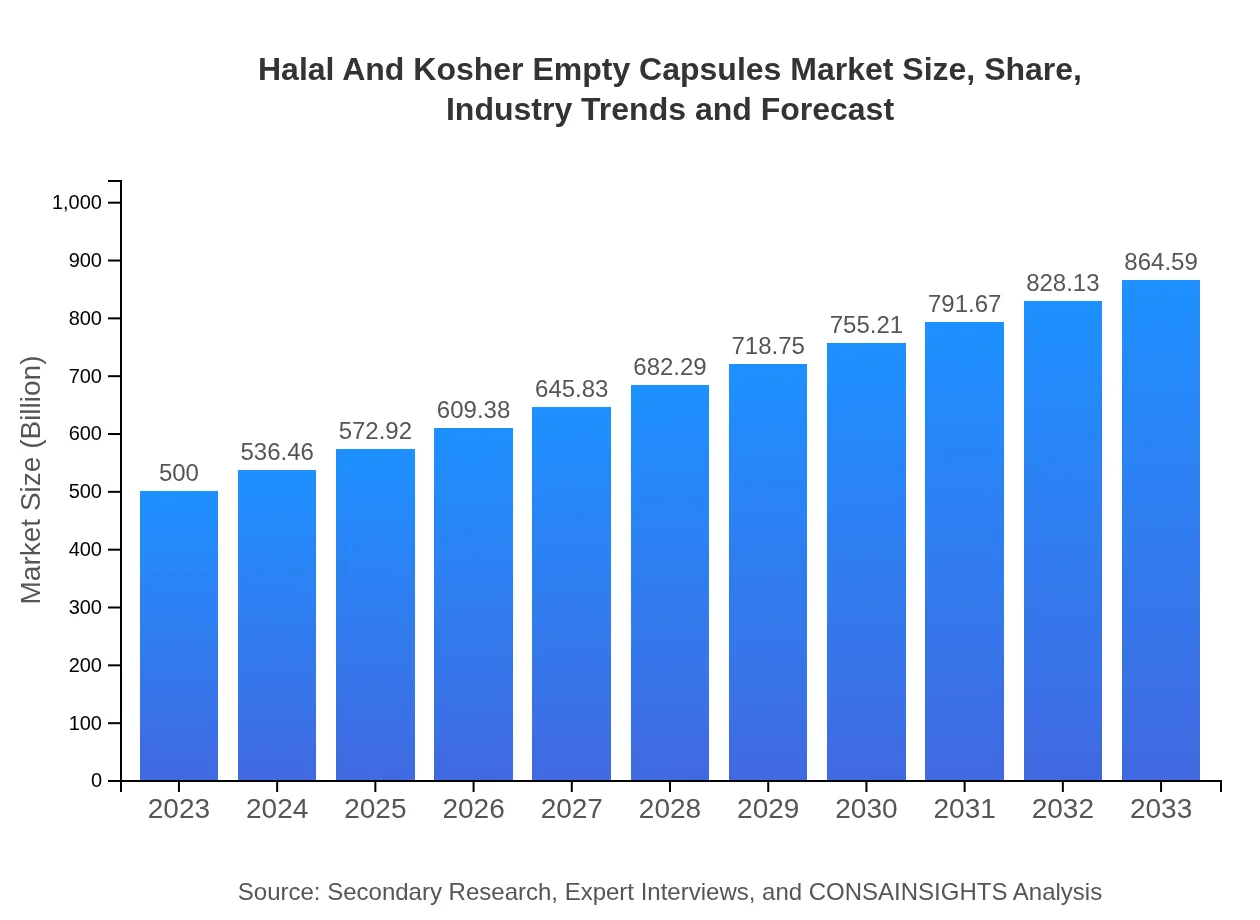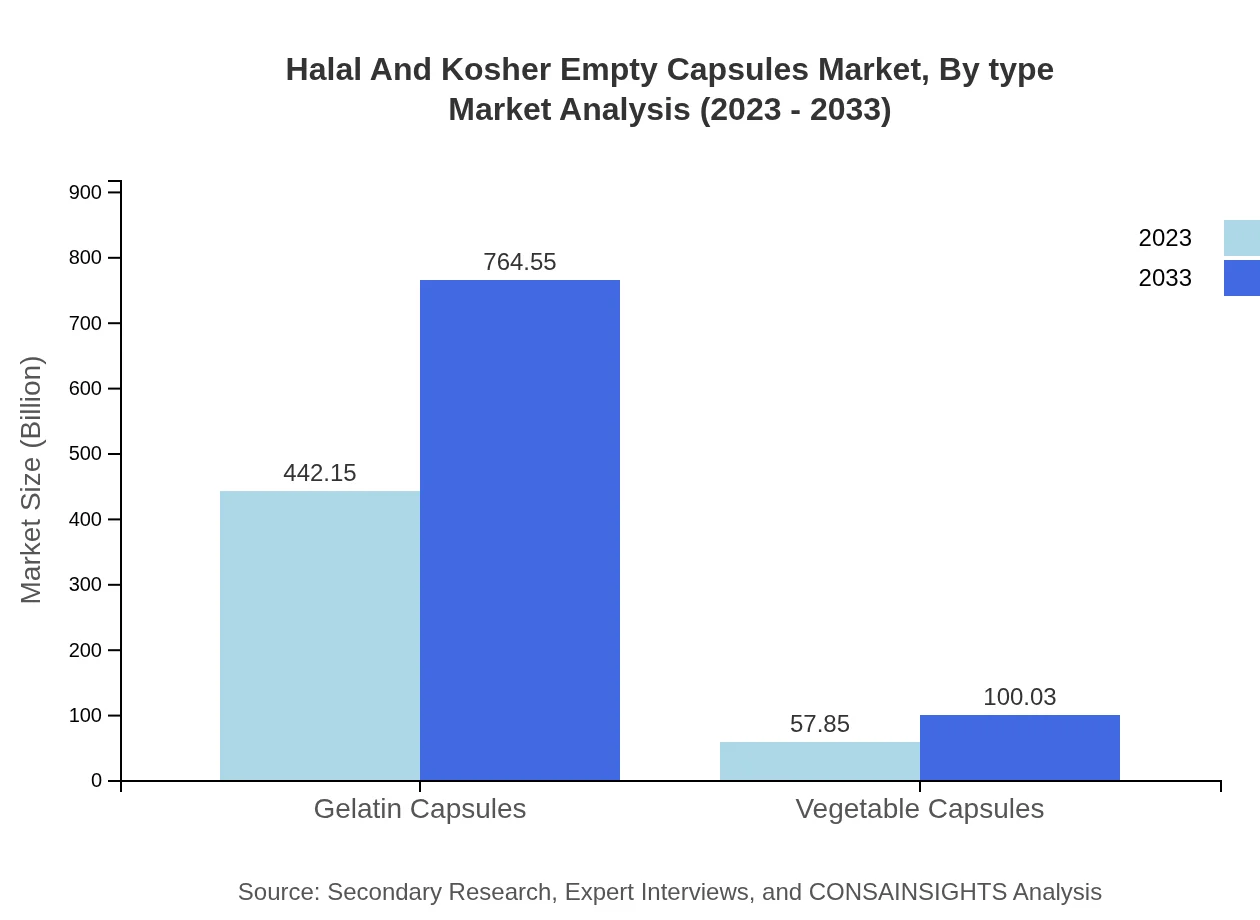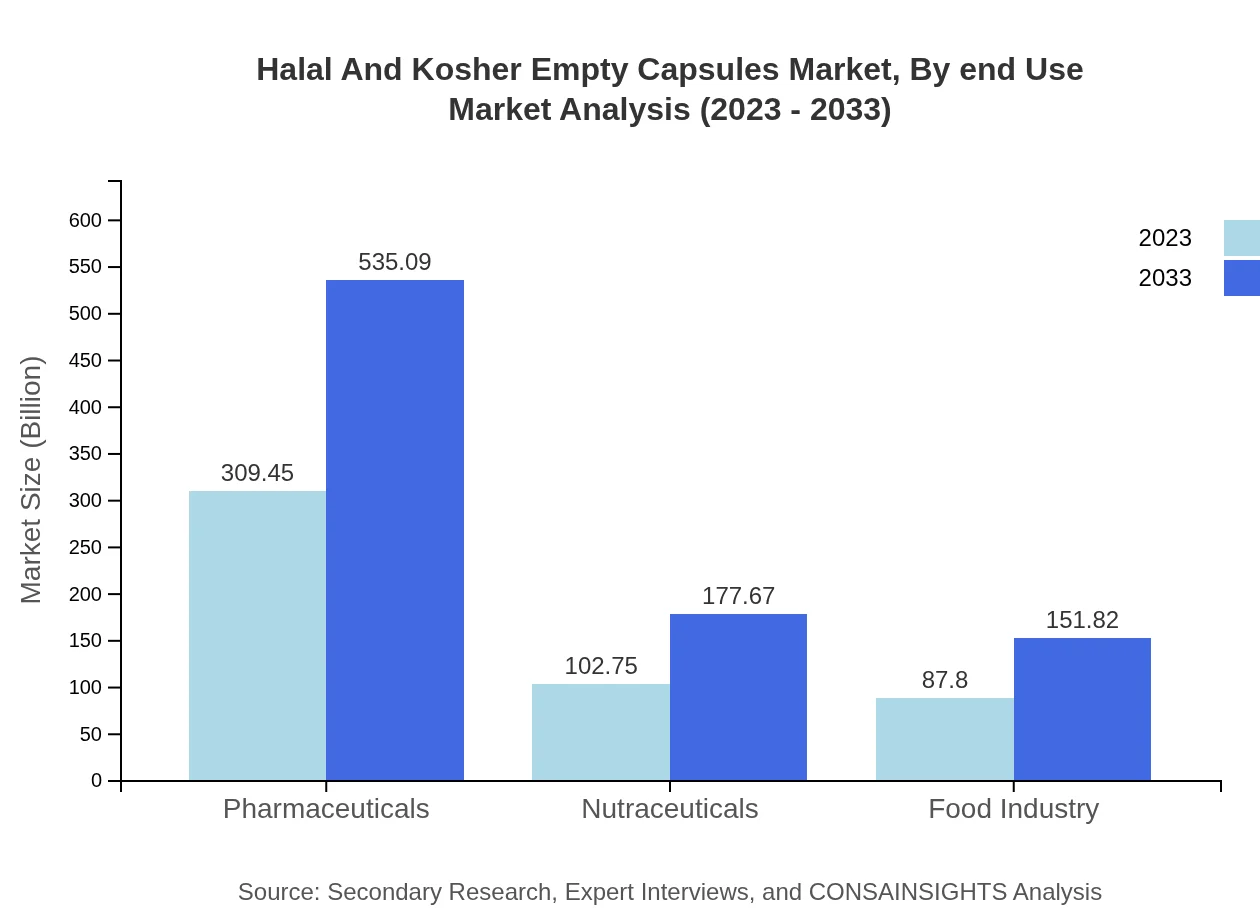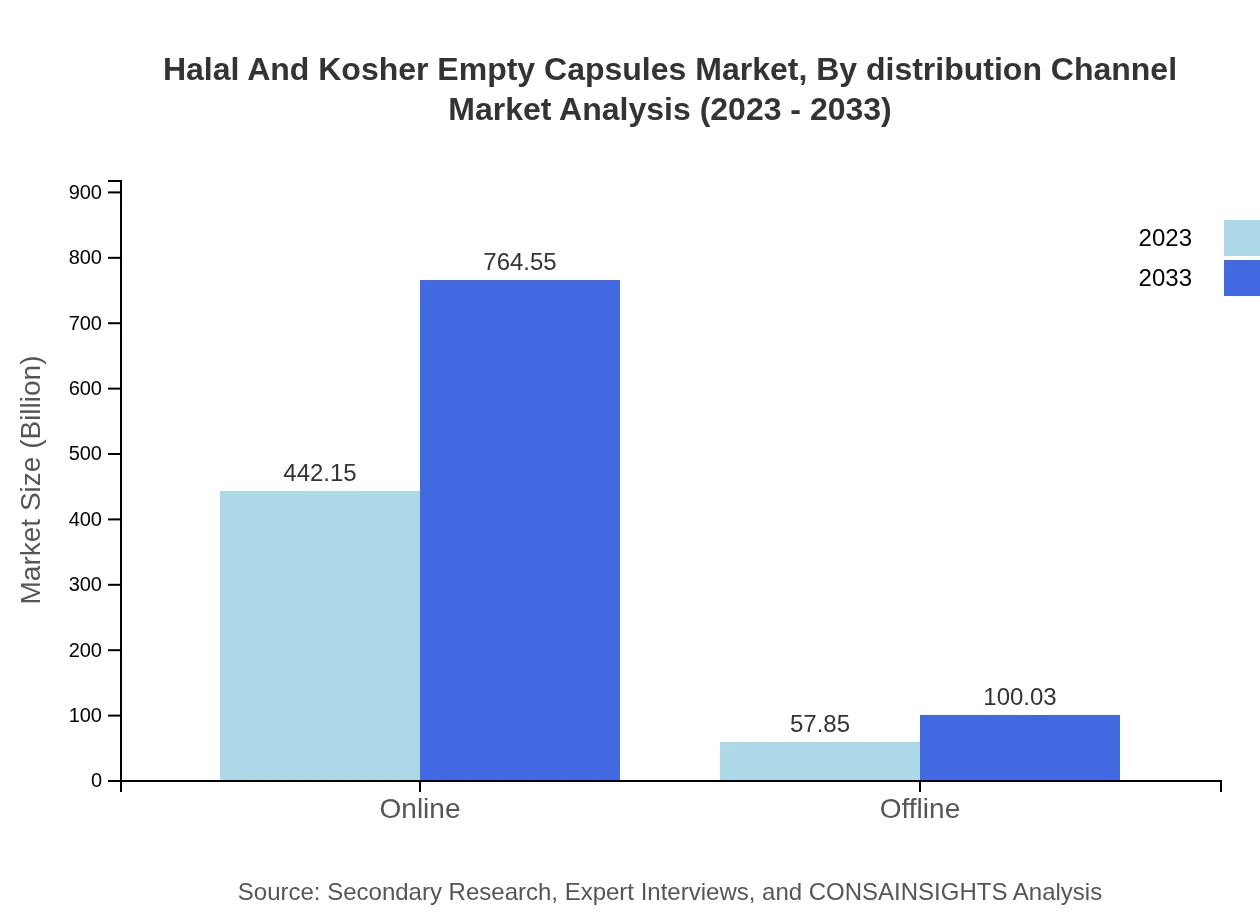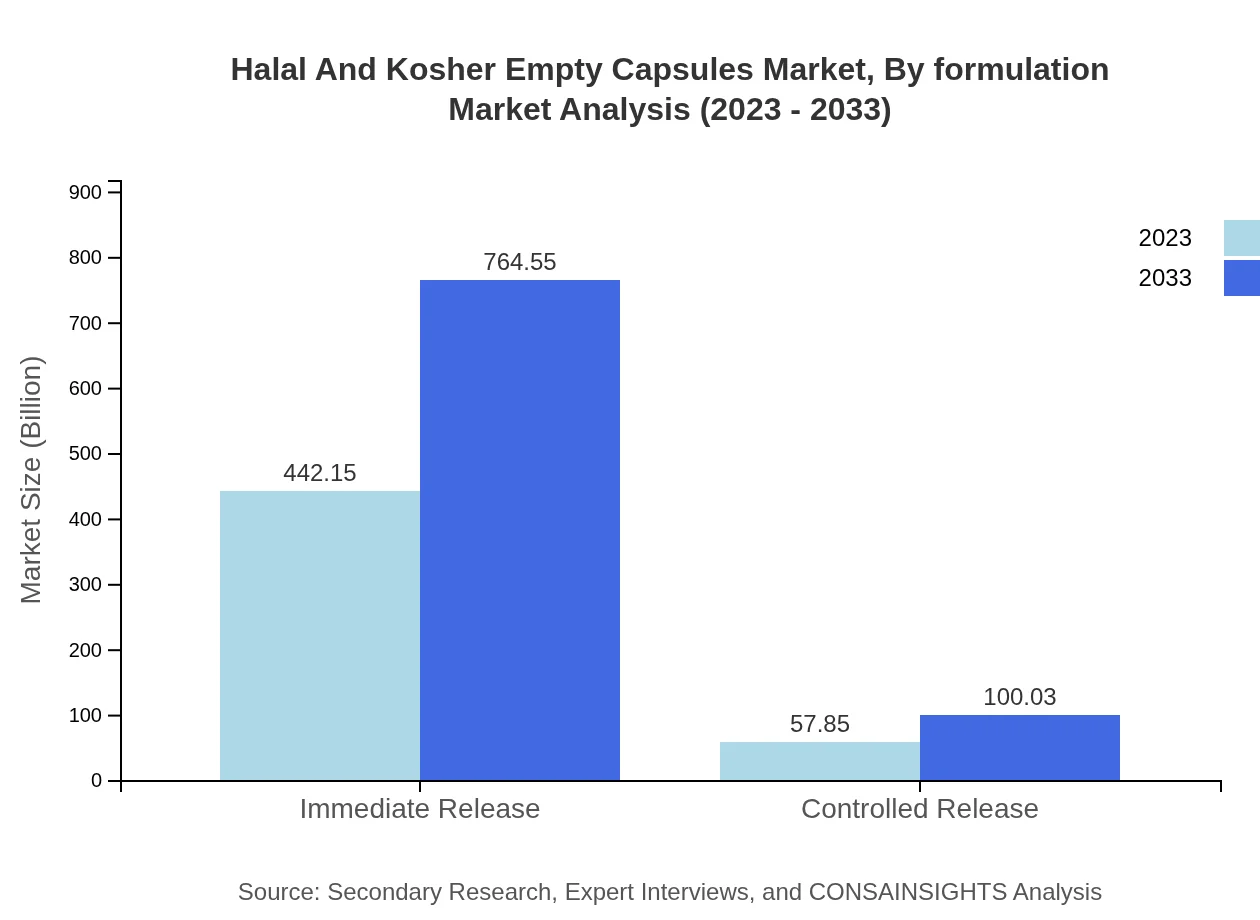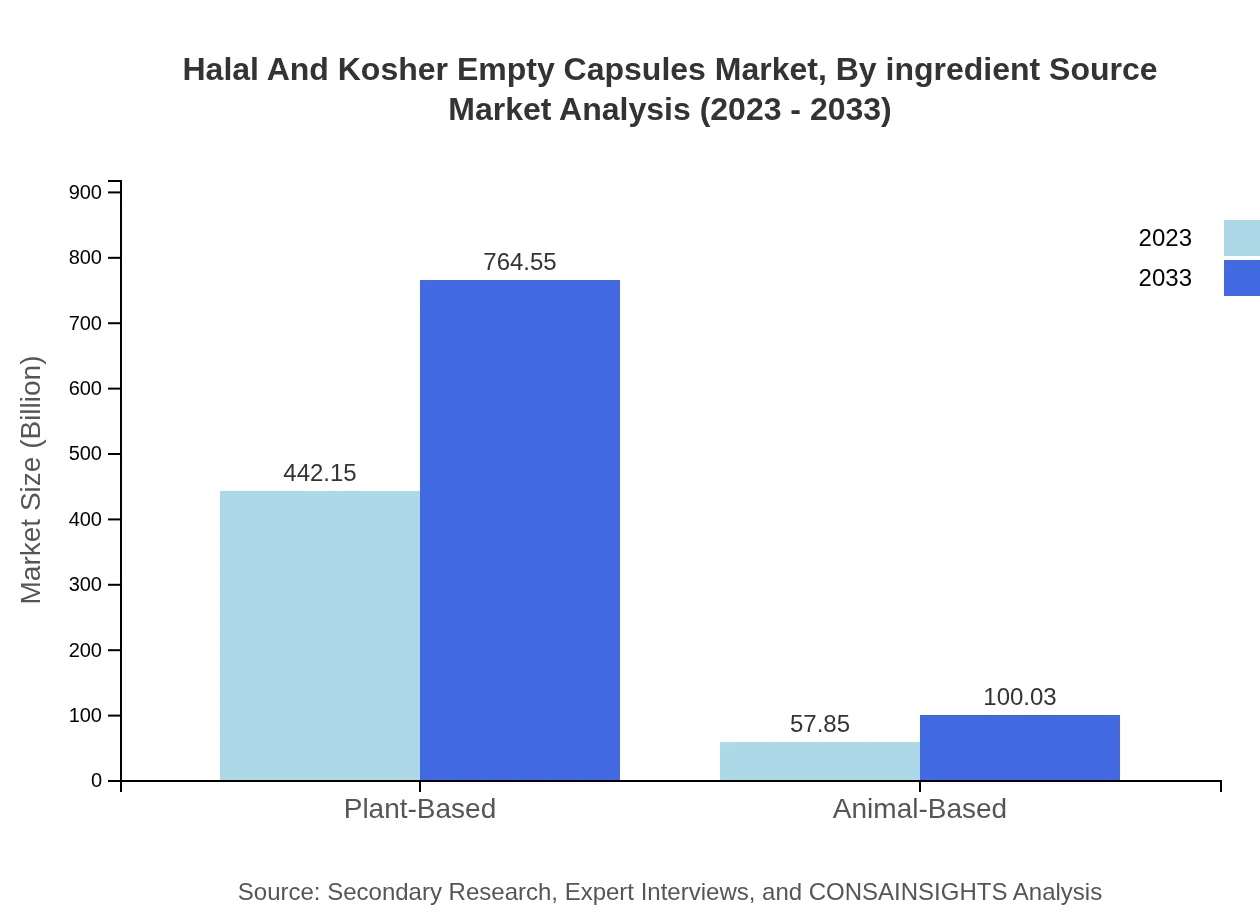Halal And Kosher Empty Capsules Market Report
Published Date: 31 January 2026 | Report Code: halal-and-kosher-empty-capsules
Halal And Kosher Empty Capsules Market Size, Share, Industry Trends and Forecast to 2033
This report provides a comprehensive analysis of the Halal and Kosher Empty Capsules market, covering market size, trends, and regional insights from 2023 to 2033. It highlights key drivers, challenges, and opportunities within the industry.
| Metric | Value |
|---|---|
| Study Period | 2023 - 2033 |
| 2023 Market Size | $500.00 Million |
| CAGR (2023-2033) | 5.5% |
| 2033 Market Size | $864.59 Million |
| Top Companies | Capsugel, Qualicaps, Lonza, HPM Global |
| Last Modified Date | 31 January 2026 |
Halal And Kosher Empty Capsules Market Overview
Customize Halal And Kosher Empty Capsules Market Report market research report
- ✔ Get in-depth analysis of Halal And Kosher Empty Capsules market size, growth, and forecasts.
- ✔ Understand Halal And Kosher Empty Capsules's regional dynamics and industry-specific trends.
- ✔ Identify potential applications, end-user demand, and growth segments in Halal And Kosher Empty Capsules
What is the Market Size & CAGR of Halal And Kosher Empty Capsules market in 2023?
Halal And Kosher Empty Capsules Industry Analysis
Halal And Kosher Empty Capsules Market Segmentation and Scope
Tell us your focus area and get a customized research report.
Halal And Kosher Empty Capsules Market Analysis Report by Region
Europe Halal And Kosher Empty Capsules Market Report:
Europe's market is set to expand from $126.35 million in 2023 to $218.48 million by 2033. Stringent regulations for Halal and Kosher certifications in the EU enhance product demand among health-conscious consumers.Asia Pacific Halal And Kosher Empty Capsules Market Report:
In the Asia Pacific region, the Halal and Kosher empty capsules market is forecasted to grow from $105.25 million in 2023 to $182.00 million by 2033, driven by population growth and an increasing focus on health and wellness among consumers.North America Halal And Kosher Empty Capsules Market Report:
North America leads in market size with projections of $161.25 million in 2023, increasing to $278.83 million by 2033. The region's growth is attributed to a well-established nutraceutical sector and the increasing trend of health-focused products.South America Halal And Kosher Empty Capsules Market Report:
The South American market is expected to increase from $48.35 million in 2023 to $83.61 million by 2033. Factors contributing to this growth include rising disposable incomes and greater awareness regarding health supplements.Middle East & Africa Halal And Kosher Empty Capsules Market Report:
The Middle East and Africa region shows notable growth, with the market expected to rise from $58.80 million in 2023 to $101.68 million by 2033, propelled by the rise of dietary supplements aligned with Islamic dietary laws.Tell us your focus area and get a customized research report.
Halal And Kosher Empty Capsules Market Analysis By Type
The Halal and Kosher empty capsules market is categorized into gelatin capsules and vegetable capsules. The global gelatin segments size is projected to reach $442.15 million, dominating the market due to its cost-effectiveness and widespread acceptance. In contrast, vegetable capsules are expected to rise from $57.85 million in 2023 to $100.03 million by 2033, appealing to the vegan demographic.
Halal And Kosher Empty Capsules Market Analysis By End Use
Pharmaceuticals represent the largest segment, expected to grow from $309.45 million in 2023 to $535.09 million in 2033, bolstered by increasing health awareness and the demand for dietary supplements. The nutraceuticals and food industry segments also contribute significantly, with their respective sizing of $102.75 million and $87.80 million in 2023.
Halal And Kosher Empty Capsules Market Analysis By Distribution Channel
Distribution channels are bifurcated between online and offline segments. The online channel holds a significant share of the market due to increasing e-commerce usage, with expectations of growth from $442.15 million in 2023 to $764.55 million by 2033. The offline segment, although growing, is expected to generate less revenue with a rise from $57.85 million to $100.03 million over the same period.
Halal And Kosher Empty Capsules Market Analysis By Formulation
The formulation of Halal and Kosher empty capsules is primarily segregated into immediate release and controlled release types. Immediate release capsules dominate the market, generating $442.15 million in 2023, while controlled release types are anticipated to grow from $57.85 million to $100.03 million by 2033.
Halal And Kosher Empty Capsules Market Analysis By Ingredient Source
The ingredient source is categorized into plant-based and animal-based inputs. Plant-based capsules constitute the larger share and are projected to maintain dominance, shaping the market's future trends towards healthier, more environmentally sustainable solutions.
Halal And Kosher Empty Capsules Market Trends and Future Forecast
Tell us your focus area and get a customized research report.
Global Market Leaders and Top Companies in Halal And Kosher Empty Capsules Industry
Capsugel:
A global leader in capsule and advanced delivery technologies, Capsugel offers a wide range of Halal and Kosher-certified products, focusing on innovation and sustainability.Qualicaps:
Qualicaps is known for its quality and range of gelatin and vegetable capsules, emphasizing strong compliance with Halal and Kosher standards in its manufacturing processes.Lonza:
Lonza specializes in the development and manufacturing of pharmaceutical and nutraceutical delivery systems, including Halal and Kosher capsules aimed at enhancing consumer health.HPM Global:
HPM Global offers a variety of empty capsules that meet Halal and Kosher compliance, focusing on the vegan and vegetarian market, with a commitment to innovation.We're grateful to work with incredible clients.









FAQs
What is the market size of halal And Kosher Empty Capsules?
The halal and kosher empty capsules market size is projected to reach $500 million by 2023, with an estimated CAGR of 5.5% from 2023 to 2033, reflecting strong growth in demand across various sectors.
What are the key market players or companies in this halal And Kosher Empty Capsules industry?
Key players in the halal and kosher empty capsules market include major pharmaceutical and nutraceutical companies, along with distributors specializing in dietary supplements, catering to a diverse customer base with specific religious dietary needs.
What are the primary factors driving the growth in the halal and kosher Empty Capsules industry?
Key growth factors include increasing health awareness, rising demand for vegetarian and halal products, and expanding pharmaceutical applications. Consumer preference for natural ingredients further boosts the demand for halal and kosher empty capsules.
Which region is the fastest Growing in the halal and kosher empty Capsules?
The Asia Pacific region is the fastest-growing market for halal and kosher empty capsules, expected to grow from $105.25 million in 2023 to $182.00 million by 2033, driven by rising population and health consciousness.
Does Consainsights provide customized market report data for the halal and kosher empty Capsules industry?
Yes, Consainsights offers customized market report data tailored to specific queries regarding the halal and kosher empty capsules industry, ensuring clients receive relevant and actionable insights.
What deliverables can I expect from this halal and kosher empty Capsules market research project?
Deliverables include comprehensive market analysis, competitive landscape overview, segmentation breakdown, and projections for market growth and trends, all tailored to inform strategic decisions in the halal and kosher empty capsules sector.
What are the market trends of halal And Kosher Empty Capsules?
Current trends include a shift towards plant-based solutions, increasing online sales channels, and a growing preference for sustainable packaging in the halal and kosher empty capsules market, reflecting broader consumer values.

